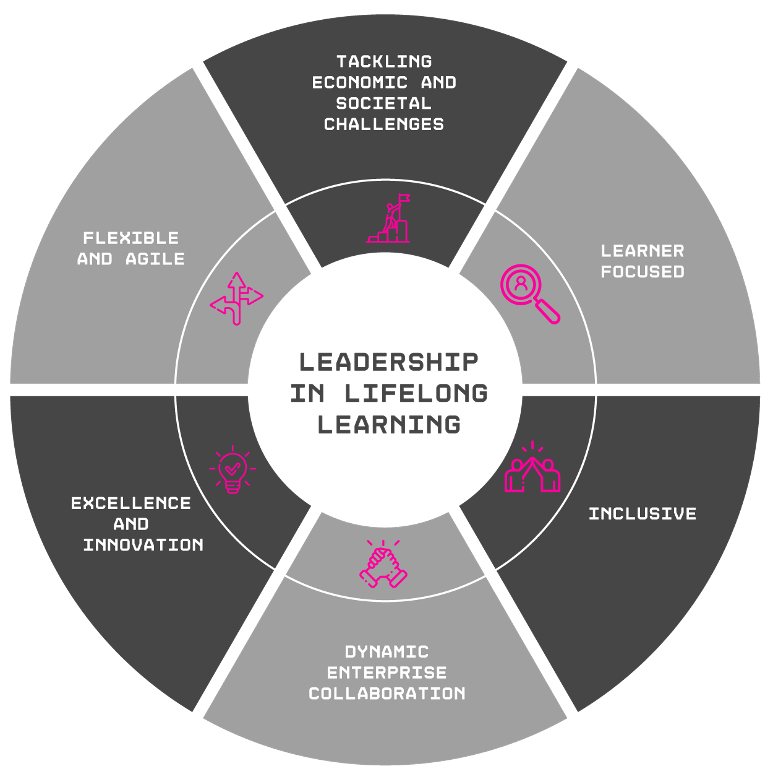About the MicroCreds Project:
MicroCreds is an ambitious €14.3 million project (2020-2026) led by the IUA in partnership with seven IUA universities: University College Dublin, University College Cork, University of Limerick, Trinity College Dublin, Dublin City University, University of Galway and Maynooth University with TU Dublin joining the project in early 2025.
The project funding was awarded following a competitive process under the Department of Further and Higher Education, Research, Innovation and Science’s (DFHERIS) Human Capital Initiative Pillar 3 Innovation and Agility, with funding drawn from the National Training Fund.
We have been the first European country to establish a coherent National Framework for quality assured and accredited micro-credentials. IUA project partner universities are collaborating to develop, pilot and evaluate the building blocks required for a transformation in lifelong and life-wide learning through micro-credentials. Micro-credentials developed at partner universities will set the standard for excellence in flexible and agile learning.
We are working in partnership with learners and our Enterprise Advisory Group, comprising senior enterprise members from business representative organisations, enterprise agencies, private sector companies and state bodies with responsibility for skills to change thinking about and engagement structures with university learning. We are focusing on learners who are seeking to up-skill, re-skill, return to employment or change careers.
MicroCreds has 4 key deliverable strands:
Strand 1: National Framework for micro-credentials
Strand 2: MicroCreds Innovate sustainable model for data informed university – enterprise collaboration
Strand 3: Discovery Platform linked to a digital credentialing solution (Europass early adopter)
Strand 4: Agilely developed and flexibly-delivered suite of micro-credentials across partner universities
Micro-credentials have the potential to reimagine and reframe the relationship between learners, universities, enterprise and civil society partners, generating a step change in lifelong and life-wide learning. Our aim is for MicroCreds to address many of the barriers to participation in lifelong learning, including time constraints for learners and inflexibility in current programme provision and delivery. The inherent flexibility in micro-credentials means that learners can access learning in discrete small units, at a time and pace which allows greater balance with both life and work commitments.

A fully developed framework for micro-credentials can provide learners with agile pathways from stand-alone, bite-sized micro-credentials to larger awards, allowing learning to align with and adjust to changes in learner priorities over time. It is our ambition that the MicroCreds project will leave a legacy framework and infrastructure for micro-credentials supporting engagement with wider cohorts of learners such as undergraduate students, learning for personal interest and those accessing higher education for the first time.
MicroCreds Micro-credential National Framework:
In its establishment the MicroCreds project aimed to create a coherent national framework for quality-assured and accredited micro-credentials, positioning Ireland as a leader in flexible higher education and lifelong learning.
Pillar 1 of the project focused on developing the architecture for a national framework for micro-credentials. This included establishing sector-wide agreed definitions for micro-credentials and integrating them with national and institutional quality assurance, recognition, and accreditation structures. The IUA has collaborated with Quality and Qualifications Ireland(QQI) and other stakeholders to align micro-credentials with the National Framework of Qualifications (NFQ).
This work on a national framework has been transformative, not only for the eight universities but also for the entire higher education system in Ireland. The project has created the necessary infrastructure to support the rapid development and roll-out of flexible and agile education.
By definition MicroCreds micro-credentials are credit-bearing, quality-assured, and accredited by each university, and aligned to the NFQ at levels 6-9. This initiative is helping Ireland meet national and European targets for flexible higher education and lifelong learning, supporting competitiveness in this strategically important and growing area.
Through extensive consultation with partners the MicroCreds framework recognises variance across universities, enterprise eco-systems and regional contexts. The agreed national framework for MicroCreds is:
-
Small, focused courses
-
Range from Undergraduate to Masters Level (aligned to levels 6-9 in Ireland’s NFQ)
-
Credit Size 1-30 ECTS (1 ECT= 25 Learning Hours)
-
University Quality Assured
-
Standalone credentials, some may stack towards a larger award on a pre-defined pathway
-
Developed in response to identified skills need
Ireland is the first European country to establish a coherent National Framework for quality assured and accredited micro-credentials. The MicroCreds framework aligned with the EU Council Recommendation2022 on the approach to micro-credentials for lifelong learning and employability. The Recommendation seeks to support the development, implementation and recognition of micro-credentials across institutions, businesses, sectors and borders.
Definition of Micro-Credentials:
“A micro-credential is the record of the learning outcomes that a learner has acquired following a small volume of learning. These learning outcomes have been assessed against transparent and clearly defined standards.
Courses leading to micro-credentials are designed to provide the learner with specific knowledge, skills and competences that respond to societal, personal, cultural or labour market needs.
Micro-credentials are owned by the learner, can be shared and are portable. They may be standalone or combined into larger credentials. They are underpinned by quality assurance following agreed standards in the relevant sector or area of activity.”
EU Council Recommendation on a European Approach to Micro-Credentials, June 2022
EU Council Recommendation on Micro-Credentials:
On 16 June 2022, the Council of the European Union (EU) adopted a Recommendation on a European approach to micro-credentials for lifelong learning and employability. The Recommendation seeks to support the development, implementation and recognition of micro-credentials across institutions, businesses, sectors and borders.
In April 2021 the European Commission launched a consultation on micro-credentials. The IUA’s submission to the European Commission Consultation on micro-credentials can be read here. The IUA’s submission contributed to the recent adoption of an European approach to micro-credentials.
Meet the MicroCreds Team
If you would like to learn more about MicroCreds, please contact the MicroCreds Team or the designated Project Lead in each of our IUA project partner universities. Meet the MicroCreds Team and our Enterprise Advisory Group here.
Project Funding


This project is funded under Human Capital Initiative Pillar 3, Innovation and Agility
Connect with the MicroCreds Project:
Twitter: @MicroCreds LinkedIn: @MicroCreds #MicroCredsIE